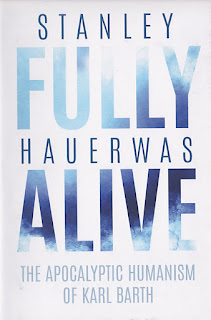A theologian and author of dozens of books, Hauerwas’ vision of the Christian life is perhaps most accessible in “Resident Aliens: Life in the Christian Colony,” co-authored with Will Willimon, a retired United Methodist bishop who, Feiler writes me, “told me recently that I reminded him of a ‘young Hauerwas’” in his constant awareness of human sinfulness and possession of a rather wicked sense of humor.
The abiding question for Hauerwas is the place of the Christian church in light of Easter’s resurrection reality, when the temptation is to succumb to narcissistic impulses or to take over the reins of secular power.
Now, in a series of lectures and occasional pieces entitled “Fully Alive: The Apocalyptic Humanism Of Karl Barth” ($29.50 in paperback from University of Virginia Press), Hauerwas reflects on key themes from a controversial career, influenced by many, but especially Swiss theologian Karl Barth (1886-1968). For Barth, as for Hauerwas, the “humanism” of liberal theology, which focuses on the human response to God, must be rejected.
In its place is the humanism revealed in Jesus Christ who in taking on our humanity revealed what it means to be fully alive, fully human. It is “apocalyptic” since Barth lived “through an apocalyptic time but also because he saw the world as forever changed by a Galilean peasant.”
Though the book isn’t the place to start with Hauerwas, it is full of trenchant observations: The capitalist system “destroys human attachment to, and affections for, relationships and institutions by embedding them in impersonal exchanges.” More sarcastically, he writes that the American story is one called “freedom”: “That story produces people who think they have been wounded by being born.”
Hauerwas considers how the Kingdom of God made manifest in Jesus Christ ought to display a new kind of politics, showing an alternative to narcissism and power that can befriend “the least of these.” His is a provocative view, but, as he observes, “Few sins are more deadly than making God boring.”



